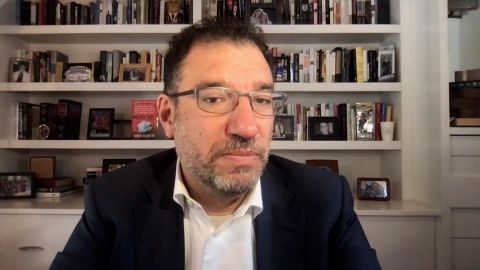Read Transcript EXPAND
BIANNA GOLODRYGA: The issue of reparations has been widely discussed, related in large part to slavery, in and of itself. But now that there has been so much attention focused on the Tulsa Race Massacre, because there had been an argument, well, how do you quantify? How do you define who it is that’s entitled to get reparations? It’s too far back. Well, when you have these sort of massacres that are specific to a city, to an area, to a community, when you can put numbers to the amount of loss that — attributed to these families for decades to come, do you think that the issue of reparations has become something that more people are open to, or, as you discuss in your book — I mean, in this piece, in this documentary, that it’s actually just as divisive? I want to get your response after we play a clip from it.
(BEGIN VIDEO CLIP)
UNIDENTIFIED MALE: The city of Tulsa has never paid reparations for those that they killed. This city and the law enforcement officer, the district attorney has never filed charges on those who committed acts of mass terror. Black lives have never mattered in this city.
(END VIDEO CLIP)
GOLODRYGA: So, the tensions are still there, Dawn.
DAWN PORTER, DIRECTOR, “RISE AGAIN”: Yes. One of the things that was so interesting, I worked with journalist DeNeen Brown of The Washington Post, and it was really important to me that this film be based on facts that could be verified and confirmed. And one of the things that we know from the situation in Tulsa is that black residents, 35 blocks of the historically black Greenwood section of Tulsa, Oklahoma, were completely obliterated, including from the air with, kerosene firebombs dropped on the neighborhoods, and the entire area of black Tulsa was burned to the ground. In the wake of that violence, the black residents of Tulsa itemized their losses and submitted them to insurance. And one of the reasons that the insurance companies denied those claims is by calling it a riot. But we have documented proof that each of the families has in trying to secure some sort of compensation in order to rebuild. So, not only were their losses documented, but we know that up to 6,000 black Tulsans were interned in camps. Where you have a situation of documented losses and people who were put in internment camps, I’m not sure how you deny those claims for reparations. This is not an amorphous claim. This is very, very specific.
About This Episode EXPAND
Andy Slavitt; Dawn Porter; Elie Honig; Keri Rodrigues and Bernita Bradley
LEARN MORE



